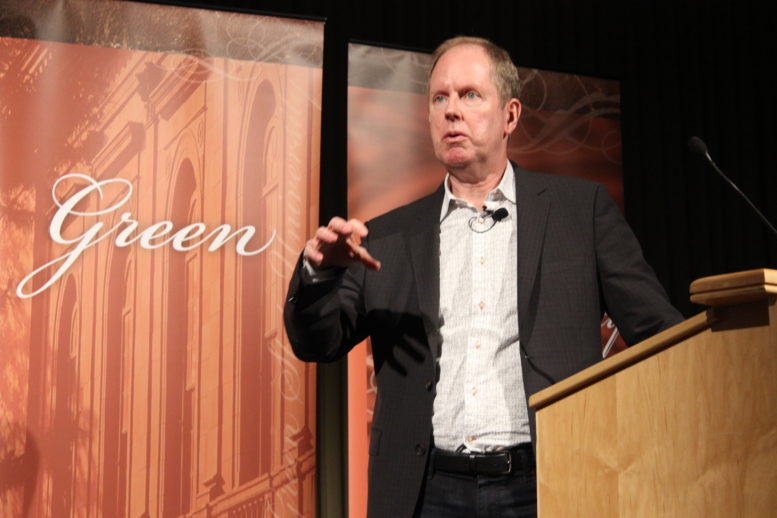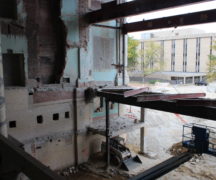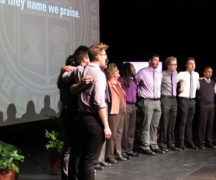By DAVID DUPONT
BG Independent News
Warren Berger travels around telling people they should ask more questions.
In some circles that could get him labeled as troublemaker; elsewhere, he’d be considered an innovator.
As a journalist Berger asks questions for a living, and he’s made them the focus of his work.
His book “A More Beautiful Question,” is the common read for Bowling Green State University this year, and the self-described “questionologist” visited campus Wednesday to further proselytize about the importance of questioning.
Asking questions, he quipped, “has allowed me to go without a job for 25 years.” Trained as a journalist at Syracuse University, he chafed at the notion of working in a newsroom where his inquiry would be subject to assignments handed out by an editor. So he ventured down the route of independent journalist.
And while he asked questions that whole time – “as a journalist questions are the only tool you have,” it has only been in the last few years that the full import of the subject has revealed itself to him.
He learned that questioning is not always valued. It challenges the status quo. And over time, people ask fewer and fewer questions.
“If you ask questions you can be seen as disruptive,” Berger said. That’s especially true of students in inner city schools.
But people are born to ask questions. It starts at age 2, he said, and peaks at about age 4. “A 4-year-old girl is the ultimate question-asking machine,” he said. She averages 300 a day, and boys that age are not far behind.
Though questioning falls off afterward, creative people continue ask them, and those questions, he discovered, have shaped our world.
The genesis of innovation, whether the internet or Airbnb, the cell phone or Gatorade, is a question.
It starts with why? – to understand the problem. Then what if? – to generate ideas. And then how about? – to start solving the problem. These questions unleash a steady stream of what he calls beautiful questions leading to change, big and small, revolutionary and incremental.
In Silicon Valley, Berger said, “questions are the new answers.”
The questioning doesn’t stop once the product is developed, he said. “It is the most effective to keep the company innovating.”
Answers, he said, have “a short shelf life.”
But questioning is not only useful for business. Berger told the students in attendance that it was key to helping them design their lives and careers.
Designers, he noted, ask lot of questions.
Questioning can help solve problems, he said.
“Questions can help you stay inspired,” he said. And they can help you inspire others.” The question “how might we?” is a powerful tool. It can empower people, and “can help you be a change agent in your own community.”
They can also help people make changes in their own lives, Berger said. People quickly forget resolutions to improve their lives, but if they are phrased as questions, they are more likely to ut them into practice.
“Questions trigger our imaginations,” he said. “They’re like a puzzle our brain wants to figure out.”
Earlier in the day, Berger participated in a panel discussion with BGSU faculty members who talked about the importance of questions in their lives and work.
Neil Browne said he felt a kinship with Berger because they both were residents of Questionland. Most people, he said, are more comfortable in Answerland.
Questionland is “scary.”
“Who knows what it has to offer?” he asked.
He’s written a book about using questions in teaching rhetoric. “How do we ethically go about persuading people?”
He also wondered about the impact on technology on students, and “how to use a wonderful resource in a manner that acquires the kind of information necessary to be innovative and evaluative in a manner that is reflective and thoughtful.”
Jean Gerard, who teaches in Family and Consumer Sciences, said that she was “a little disturbed” by the lack of questioning in the classroom. “I wonder what makes them so reticent in that context.”
This is especially true of that group of students who “are very closed and reserved.”
So after watching the film “Bully” she used an exercise in Berger’s book that has students break up into small groups and formulate questions. “Everyone was engaged,” Gerard said.
They had a discussion about their fear of being wrong that was learned early in the education, and how that discouraged questioning.
“I really appreciated the book. I think it’s going to impact the way I teach,” Gerard said.
“Setting aside the time for inquiry,” she said, is important.
Amy Fidler, who teaches graphic design, asks her art students: “When was your creativity killed?”
For most of her students, it was about by third grade. “How do you find it again?”
“One of the reasons that we find questioning difficult is it forces us to slow down,” Fidler said. “When we’re in this fast pace and we have a deadline, the question gets in the way. … We have to slow that down and make space in academia for it to happen.”
Julie Matuga, an associate provost for institutional effectiveness, said that while “A More Beautiful Question” had a lot of examples of “big C creativity,” she felt there was a need to foster “little C creativity.”
“Big C creativity” is of historic import, Mozart and Picasso. “I’m more interested in how do things become new every day for the individual.”
Kimberly Christensen, a senior lecturer and Inclusive Early Childhood Program coordinator, talked about the very personal impact questioning had on her life.
Christensen said 23 years ago her 18-month-old son almost drowned. Doctors saved him, she said. But said he would remain comatose.
Christensen said she realized that while the doctors had saved her child’s life, it was now up to her and her family to help him make the most of his life.
That questioning was a spark for intensive study. She said they set aside the question of why it happened. Instead they asked how they could make his life better each day than it was day before.
Those studies not only led to a better life for her son, but for an advanced degree and an academic career for her.
Looking back what they hoped at the time. Christensen said: “We asked questions, and we made it happen.”





